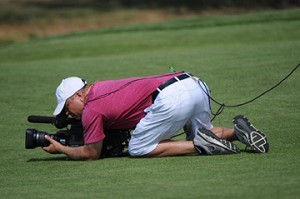Slight of Hand
By Jim McNaney
The first major of the year occurred in April at the LPGA ANA/Inspirational and if that major was any indication, this year’s major season will have a major impact on golf.
Sure the play was superb but what really stood out was a ruling that will have a much greater effect on the game than anyone could have possibly imagined.
By now, most people are aware of the 4 stroke penalty assessed to final round leader Lexi Thompson but for the few that don’t, she was assessed the penalty for a rules infraction that took place on the back nine of the tournament’s third round on Saturday.
Yes, you read that correctly. Thompson was assessed the penalty almost 24 hours after the infraction occurred. Two strokes for playing from a wrong spot when she improperly marked her ball and another 2 strokes for signing an incorrect scorecard.
The decision hit social media like a hurricane. There are far too many issues from this event for me to cover in the space I have. How could it happen 24 hours later? Did she do it on purpose? How could she be penalized for signing an incorrect scorecard when the penalty for the infraction was not assessed until after she signed? The list goes on and on.
Since I focus mostly on technology here, I would like to address one in particular: viewers calling in infractions.
The advent of HD televisions has provided the viewers with the best experience without actually being at the course. DVR’s afford us the luxury of recording all the action and watching our favorite moments over and over again. We can even pause and rewind live television broadcasts. These are all great innovations, which actually do bring viewers closer to the game.
These innovations have made it possible for the NFL to have replay challenges. The NHL reviews goals. Even the MLB, which has the greatest affection for “the human element” of any major sport in officiating their game, has adopted instant replay. There is one HUGE difference between how those sports use replay and how golf does. In those sports people actually INVOLVED in the event are responsible to either ask for a review or officials initiate the review.
In golf, we have this weird thing where people sitting on their couch call into the tournament officials (although no one seems to actually know what that number is and how anyone in the viewing public gets it) and report an infraction they claim to have witnessed. Rules officials feel obligated to take a look and if they do see an infraction they have to act.
Rules officials are tasked with protecting the field so they always feel compelled to react to something called to their attention. That’s the argument we’ve been told for years and I can accept that they feel they are doing the right thing.
The problem is taking a call from a viewer is not actually equitable to the entire field. Not every shot is played in front of the cameras. Those playing well are exposed more than the rest of the field. In the other sports, the entire game is played in front of the cameras.
You may say, “That’s the price you pay for playing well.”
Think of it this way. Late Friday afternoon, someone may make the same infraction Lexi did but no camera is there to catch it. Someone else misses the cut by one stroke and loses his or her tour status. That player was not afforded the same protection as the players at the top of the leader board.
My argument is not a new one, and there were many other compelling arguments on both sides in this incident. What made this one so unique…the USGA and R&A did not wait two years to act.
April 25th the two organizations enacted and new decision, EFFECTIVE IMMEDIATELY. In essence, a tournament committee can, in effect, ignore an infraction that would not be visible by the “naked eye.” In an interview with Golf Magazine, senior director for Rules of Golf and Amateur Status for the USGA, Thomas Pagel said “As technology has continued to improve, it has enhanced the viewing experience for fans but it has also raised the possibility of uncomfortable scenarios where the TV cameras see something the naked eye cannot. Addressing that issue immediately is good for the game.”
That last sentence is why this major season will have the most impact on the game than we could have imagined. The ruling bodies realized that, in the information age, where global communication is instant, they couldn’t wait two years to act. They are proving to the rest of us that love the game that they can, at least once in a while, adapt to times.
Welcome to the 21st century.






























